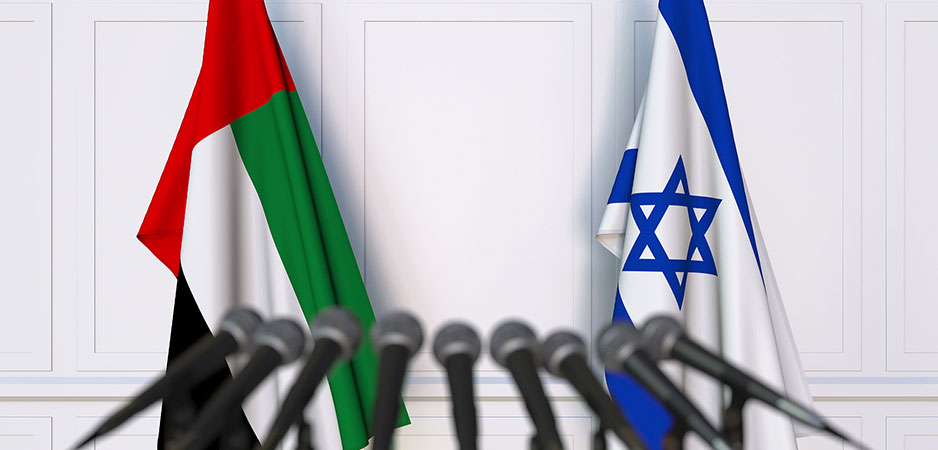The August 13 announcement of normalized relations between Israel and the United Arab Emirates breaks the quarter-century standstill in Arab-Israeli relations and shows that Arab states will no longer hold their interests hostage to the long-dormant Israeli-Palestinian peace negotiations. President Donald Trump made the announcement of the establishment of relations between the two countries from the White House, suggesting that his administration played an instrumental role in the action. He referred to a call the same day with Prime Minister Benjamin Netanyahu of Israel and Crown Prince Mohammed bin Zayed of the United Arab Emirates.
The exact American role in the deal — other than giving the agreement a name, the Abraham Accord, in honor of the prophet important to both Judaism and Islam as well as Christianity — is unclear.
The One-State Reality to the Israeli-Palestinian Conflict
What is most apparent is that the two countries, which have had substantial informal interactions in fields like trade, technology, health and security for years, have finally moved to normalize those ties. The immediate upshot is that for the first time in nearly 26 years, an Arab state has formally recognized the Jewish state. Moreover, the UAE becomes the first Arab nation that has relations with Israel but no shared border. Egypt and Jordan, which each share borders with Israel, established ties in 1980 and 1994, respectively.
Why Wait?
Previously, Arab states, including the UAE, held out the prospect of normalized relations on condition of the establishment of two states, Israel and Palestine, along the borders that existed prior to the 1967 War. With its decision today, the UAE is saying it is no longer willing to wait for such an outcome, especially when its own interests are advanced by opening formal ties with Israel. Despite the Trump administration’s announced “deal of the century” — officially Peace to Prosperity: A Vision to Improve the Lives of the Palestinian and Israeli People — to much fanfare in June of last year, Israeli-Palestinian negotiations have made no headway since Secretary of State John Kerry’s failed year-long effort six years ago.
The UAE extracted one apparent concession from Jerusalem: Netanyahu will suspend annexation plans for the West Bank. That gives the Emirates the political cover it needs not only for its own population — by now probably agnostic on the whole Israel-Palestine dispute — but also for other Arab states, especially those more likely to criticize Abu Dhabi’s decision (likely few outside the usual pariahs). In fact, aware of the benefits that accrue to normalizing ties with the nation now considered the most powerful and technologically advanced in the Middle East, other Arab nations are now more likely to follow the UAE’s lead.
Moreover, nations recognizing Israel are also more likely to earn Washington’s — and especially this administration’s — favor. In the case of the UAE, which already enjoys close ties with the US, that won’t mean a great deal immediately. Down the road, however — that is after the November election — it could mean attractive baubles like a free trade agreement or expanded security ties, regardless of who comes out on top in the American election.
A Boon to Bibi in Troubled Times
Traditionally, when nations establish diplomatic relations, they open embassies in respective capitals. For Israel, that will mean a new embassy in Abu Dhabi, and probably a consulate in Dubai as well, given its economic prominence in the country. But the UAE must decide where to locate its embassy. Will it be in Tel Aviv, where most nations of the world have had their embassies after Israeli independence in 1948, or in Jerusalem, Israel’s official capital and where the US relocated its embassy in February of 2018? Other nations also have opened embassies in Jerusalem, but no other major country. By setting up an embassy in Jerusalem, Abu Dhabi would implicitly recognize Jerusalem as Israel’s capital, effectively a double win for Israel. That decision will be a thorny one for the wealthy Gulf state. It may wish to hold out for further concessions than just the annexation postponement.
Annexation has been on indefinite hold since early last month when Netanyahu failed to act on previous pledges, reportedly because of Washington’s cold feet. Taking it off the table now is, therefore, hardly a sacrifice for Netanyahu. Even in Israel itself, it was viewed with mixed emotions.
The ever-wily Bibi turned what had looked to be a political loss into a fairly significant foreign policy win for the Jewish state. And he needed it. Since early summer, thousands of Israelis have taken to the streets, mostly in Jerusalem, to protest against Netanyahu and call for his departure. Most of those critics are on the political left, which poses little threat to his continued rule. But he is also facing heat from his right, which presents far more of a threat. The conservative prime minister has historically drawn his support from the powerful right of Israel’s political spectrum, which dominates Israel’s electorate. So, getting this victory today — recognition by a major Arab state — allows him to again show his remarkable ability to advance Israel’s interests.
That’s doubly important in view of the declining state of affairs between him and his erstwhile partner in government, Benny Gantz. Netanyahu’s ongoing corruption trial, a budget dispute between him and Gantz, and the recent surge in COVID-19 infections in Israel have cast a shadow over the unity government. Were it not for today’s announcement and Gantz’s declining political support within Israel, a new election, which now seems likely, Netanyahu’s 11-year reign might have been facing its denouement.
Nothing for the Palestinians, Even Less for Iran
Pointedly, in the entire announcement event at the White House, Palestine was not mentioned. Trump was accompanied by a parade of other administration officials, whose involvement in the accord was never made clear. None of them referred to either Israel-Palestine relations or to the annexation postponement. This is bad news for President Mahmoud Abbas and the Palestinians. The annexation postponement is a mere short-term sop, and they know it. Given the ambitions of those on Israel’s political right, annexation will be a fact of life. A Joe Biden win in November might stall it, but only for a while. A Trump victory will make it inevitable and likely soon.
The real message to Abbas is that Arab governments are tired of waiting. The UAE has made the first move. Other Arab states are likely to follow suit in the near future. Two in particular, Qatar and Oman, have already shown interest in expanded ties with Jerusalem for the very same reasons as the UAE.
The announcement’s unspoken message to Ramallah is to get on with it — to negotiate and settle with Israel while there’s still some chance for an independent Palestinian state. The previous Arab conditions to the normalization of ties with Israel have exceeded their shelf life. Arab states are moving on. Abbas and the Palestinians need to do the same. Even a Biden victory won’t change this.
Iran was briefly mentioned in the proceedings, by former administration Iran point man, Brian Hook, who resigned earlier this month. He needn’t have done so. Tehran can’t be pleased with the decision of the Emirates, which are located barely 25 miles across the Strait of Hormuz from Iran. Israel is likely to gain greater cooperation and coordination with the UAE armed forces, which already maintain very strong ties with the US. In addition, Israel will likely gain a prime observation perch for intelligence gathering on the Islamic Republic.
Today’s announcement amounts to a significant setback for Iran. It may go too far to say that Washington’s dream of an Arab-Israeli anti-Iran alliance is in the works. But if one other Gulf state acts similarly, that’s exactly how the Trump administration will portray it — and how Iran may come to view it. That may be a good thing for the US, Arab nations and Israel, even if the likelihood of such an actual alliance is remote.
The views expressed in this article are the author’s own and do not necessarily reflect Fair Observer’s editorial policy.
Support Fair Observer
We rely on your support for our independence, diversity and quality.
For more than 10 years, Fair Observer has been free, fair and independent. No billionaire owns us, no advertisers control us. We are a reader-supported nonprofit. Unlike many other publications, we keep our content free for readers regardless of where they live or whether they can afford to pay. We have no paywalls and no ads.
In the post-truth era of fake news, echo chambers and filter bubbles, we publish a plurality of perspectives from around the world. Anyone can publish with us, but everyone goes through a rigorous editorial process. So, you get fact-checked, well-reasoned content instead of noise.
We publish 2,500+ voices from 90+ countries. We also conduct education and training programs
on subjects ranging from digital media and journalism to writing and critical thinking. This
doesn’t come cheap. Servers, editors, trainers and web developers cost
money.
Please consider supporting us on a regular basis as a recurring donor or a
sustaining member.
Will you support FO’s journalism?
We rely on your support for our independence, diversity and quality.






